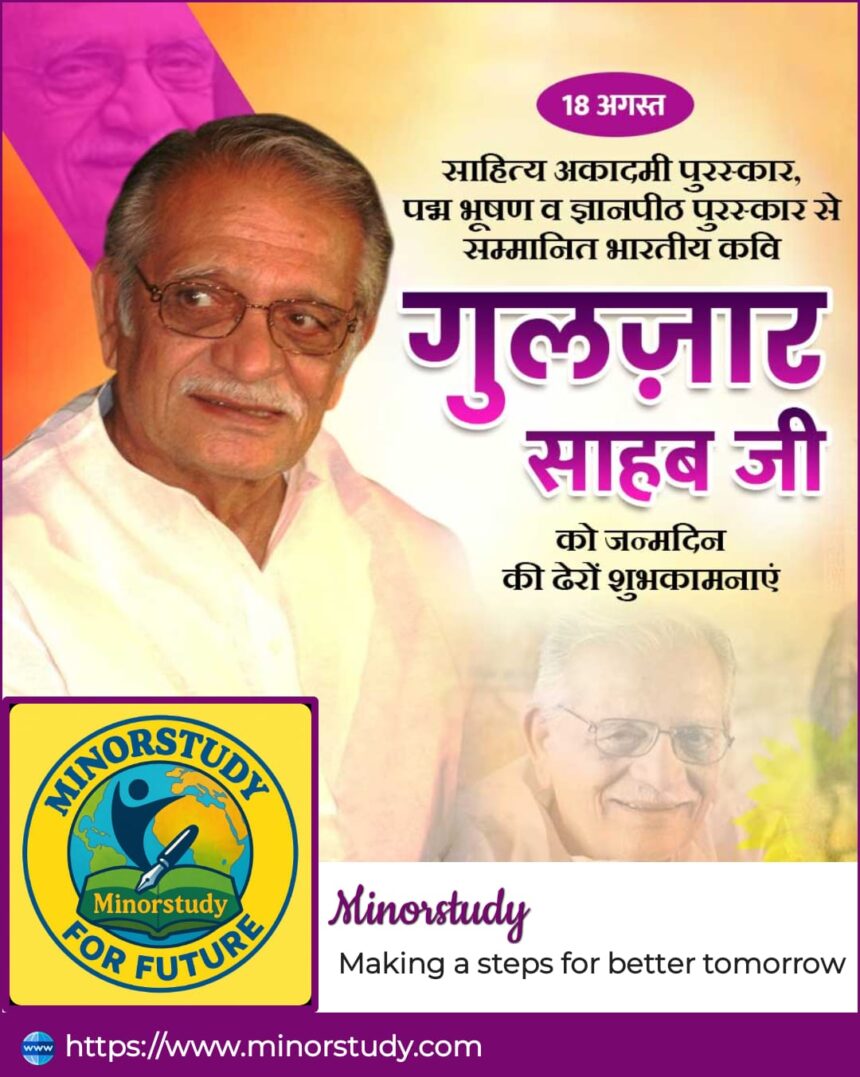“If words had a fragrance, they would smell like Gulzar Sahab Ji’s poetry—calm, deep, and eternal.”
✨ Introduction
When you hear the name Gulzar Sahab Ji, you don’t just think of a poet, lyricist, or filmmaker—you think of a soulful magician of words who gave emotions a language and made silence meaningful. Known for his simplicity, depth, and unmatched artistry, Gulzar Sahab Ji has carved a permanent place in the hearts of millions across generations.
From penning heart-touching poems and evergreen songs to directing films that explore the human soul, Gulzar Sahab Ji is a name synonymous with creativity, compassion, and cultural richness. His contribution goes far beyond Bollywood; he represents the artistic and philosophical spirit of India.
This article explores his history, achievements, inspiring facts, FAQs, timeline, and significance, along with heartfelt reflections on his impact on daily life and society.
📖 History of Gulzar Sahab Ji
Full Name: Sampooran Singh Kalra (Gulzar is his pen name)
Birth: 18 August 1934, Dina (now in Pakistan)
Occupation: Poet, lyricist, filmmaker, scriptwriter, author
Notable Works: Lyrics for films like Anand, Mausam, Aandhi, Masoom, Dil Se, Slumdog Millionaire, poetry collections, children’s stories, and translations of Tagore’s works.
Awards: Academy Award (Oscar), Grammy, Sahitya Akademi Award, Padma Bhushan, Dadasaheb Phalke Award, National Film Awards, and multiple Filmfare Awards.
Born in pre-partition India, Gulzar Sahab Ji’s journey started from being an automobile mechanic in Mumbai to becoming one of the most iconic cultural personalities of India. His pen name “Gulzar” itself reflects his personality—like a blooming garden of words.
🌟 10 Inspiring Facts About Gulzar Sahab Ji
He Started as a Mechanic – Before films, Gulzar Sahab Ji worked in a garage to support himself. His passion for poetry kept him going.
His First Break Came from Bimal Roy – Legendary filmmaker Bimal Roy gave him his first opportunity to write songs for the movie Bandini (1963).
Multilingual Mastery – He writes in Urdu, Hindi, Punjabi, and even translates Bengali works.
Poet of Simplicity – His verses are deeply philosophical yet written in a language even a child can understand.
Children’s Literature – Gulzar Sahab Ji also wrote stories and rhymes for children, showing his versatility.
Part of Progressive Writers’ Movement – His writings often carried a progressive and humanist tone, reflecting societal struggles.
Oscar and Grammy Winner – He won an Oscar and Grammy for the song Jai Ho from Slumdog Millionaire.
Friendship with Music Greats – His collaborations with R.D. Burman, Vishal Bhardwaj, and A.R. Rahman produced timeless music.
Author of Depth – Books like Raavi Paar and Pukhraj showcase his literary brilliance beyond films.
A Bridge Between Generations – From the songs of the 60s to the 2000s, his words remain evergreen and connect the young and the old alike.
📅 Timeline of Gulzar Sahab Ji
1934: Born in Dina (Jhelum District, Pakistan).
1947: Partition of India—his family migrated to India.
1963: First film break as lyricist in Bandini.
1971: Directed his first film Mere Apne.
1975–1980s: Created masterpieces like Aandhi, Mausam, Khushboo, Koshish.
1987: Directed the popular TV series Mirza Ghalib starring Naseeruddin Shah.
2008: Won Oscar and Grammy for Jai Ho.
2010s–2020s: Continued publishing poetry, books, and lending lyrics to contemporary films.
🙏 Significance of Gulzar Sahab Ji
Cultural Icon: He represents India’s literary and artistic pride.
Philosopher of Common Life: His poetry finds beauty in everyday struggles.
Voice of Emotions: From love to loss, hope to despair—he gave feelings words.
Teacher of Humanity: His works remind us of compassion, simplicity, and deep thinking.
🌍 Daily Life Impact of Gulzar Sahab Ji
His songs are sung in households, weddings, and gatherings, making him part of Indian culture.
His poetry inspires students, writers, and thinkers worldwide.
His progressive thoughts on love, relationships, and society help people reflect on their own lives.
For many, listening to his songs reduces stress, depression, and loneliness.
🎉 Wishing Gulzar Sahab Ji
On his birthday (18th August) and throughout the year, fans across the world send love and gratitude to Gulzar Sahab Ji.
👉 A simple wish could be:
“May the garden of your words continue to bloom forever, Gulzar Sahab Ji. You are not just a poet—you are our collective soul.”
🙋 FAQs About Gulzar Sahab Ji
Q1: What is Gulzar Sahab Ji’s real name?
A: Sampooran Singh Kalra.
Q2: Which was his first film as a lyricist?
A: Bandini (1963).
Q3: Did Gulzar Sahab Ji win an Oscar?
A: Yes, for the song Jai Ho in Slumdog Millionaire.
Q4: Which TV series directed by him became iconic?
A: Mirza Ghalib (1987).
Q5: Why is he called Gulzar?
A: “Gulzar” means a blooming garden, symbolizing his creative essence.
✅ Important Points to Remember
Gulzar Sahab Ji is one of India’s most respected poets and lyricists.
He bridges tradition and modernity in his writings.
His works reflect human emotions, philosophy, and social issues.
He is celebrated globally for both cinema and literature.
🌟 Conclusion
Gulzar Sahab Ji is not just an artist; he is an era in himself. His poetry is music, his films are philosophy, and his songs are healing. He inspires us to find beauty in simplicity and teaches us that words, when written with honesty, can touch millions of hearts.
In our daily lives—whether it’s through a song playing in the background, a poem read in solitude, or a dialogue in a film—Gulzar Sahab Ji is silently guiding us toward empathy, patience, and love for life.
His journey is proof that art has the power to unite generations and heal society.









What i do not realize is actually how you are not actually much more well-liked than you may be right now. You’re so intelligent. You realize thus significantly relating to this subject, produced me personally consider it from numerous varied angles. Its like women and men aren’t fascinated unless it’s one thing to do with Lady gaga! Your own stuffs great. Always maintain it up!